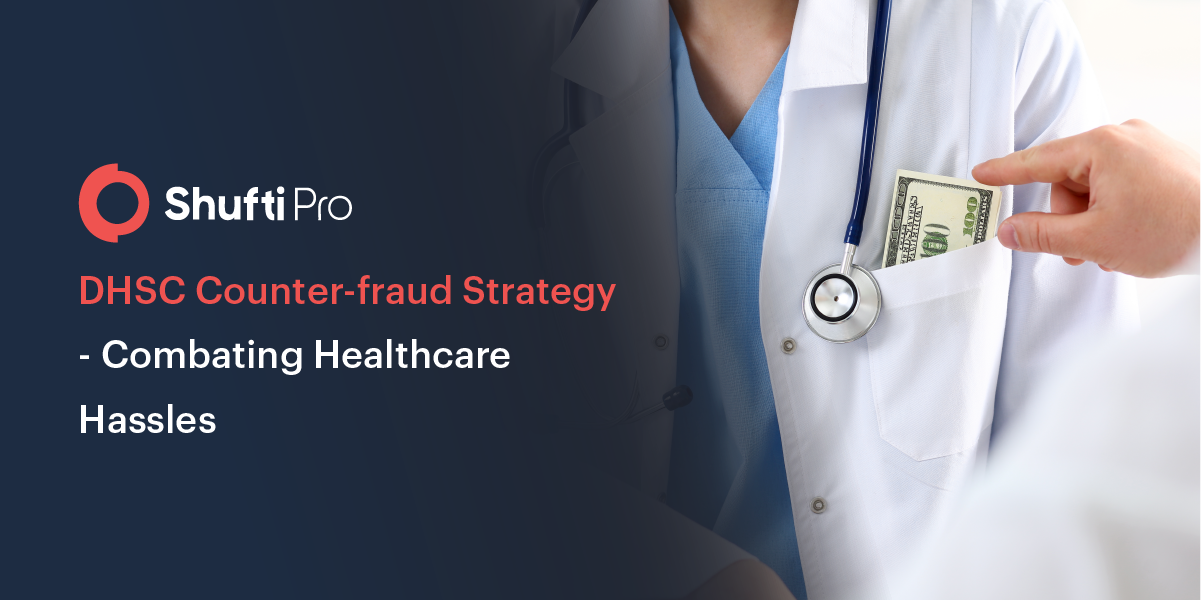DHSC’s Counter-fraud Strategy to Combat Healthcare Fraud

Healthcare remains one of the most lucrative industries for criminals with nearly $272 billion lost in medical identity theft each year. The numbers are staggering with the presence of laws like HIPAA – Health Information Portability and Accountability Act – that have a maximum of $50,000 per violation. Although regulatory authorities have enforced stringent obligations on health service providers to protect medical records of patients, there remain certain loopholes with the increased adoption of technology.
In this regard, the Department of Health and Social Care (DHSC) of the UK has introduced its counter-fraud strategy to combat emerging healthcare hassle and provider better patient care. This blog highlights the current-day context of healthcare fraud and discusses DHSC’s anti-fraud framework to counter such instances.
What is Medical Identity Theft?
The act of stealing someone’s personal information (name, address, social security number (SSN) or medical identification number) is referred to as medical identity theft. The data is then used to file false insurance claims, request online prescriptions, and acquire fake medical bills and statements, ultimately disrupting healthcare services.
Healthcare Fraud Schemes 2021
While COVID-19 created social, global and economic challenges like disrupted economy and unequal vaccine distribution, it opened new doors for bad actors as well. With time, the world grew smarter by developing countermeasures for the pandemic, but fraudsters out there who are banking on digitization are still getting the better of the healthcare industry. Some of these fraudulent incidents happened in 2021 are stated below.
$109 Million – Durable Medical Equipments
In May 2021, two defendants, Jessica Jones and Elizabeth Putulin pleaded guilty to Medicare fraud in the US district court. In a partnership with Juan Camilo Perz, they bagged a hefty $109 million by filing false insurance claims for durable medical equipment (DME). Perz conspired with both women to receive kickbacks through the US Medicare program, accounting for a HIPAA violation.
$100 Million – Home Care Services Fraud
February this year, two fraudsters in Massachusetts were allegedly involved in receiving illegitimate kickbacks through a business providing home care services. Turns out both were part of a healthcare fraud scheme since one being the co-owner was operating a shell company. On the other hand, the second culprit was a nurse who was seemingly employed there. By defrauding Medicare and MassHealth and getting referrals through kickback payments, they made $100 million in black money.
$5.4 Million – Plot for Mental Health Services
In March, a multi-million healthcare fraud takedown occurred comprising thirteen people charged with medical identity theft. The district court disclosed information about the guilty in two separate indictments unveiling links with mental health service providers. In a statement, the authorities mentioned that the criminals made medical health practitioners submit falsely-generated claims through their employers, resulting in $5.4 million in total.
Counter-fraud Framework by the DHSC
The findings by the NHS Counter Fraud Authority (NHSCFA) shows that an estimated £1.21 billion are lost as a result of financial crime originating from stolen medical records, digital fraud, bribery and embezzlement. Healthcare fraud is not limited to medical transactions but also extends to national health initiatives provided by the NHS accounting for numerous false insurance claims.
The Department of Health and Social Care (DHSC) of the UK in March 2021 proposed a strategy to identify and tackle the increasing medical theft cases. The counter-fraud framework aims at reducing fraudulent activities in the National Health System (NHS) so that funds intended for patient care, health care facilities, medical personnel and equipment does not end up in the wrong hands.
DHSC’s Principles to Combat Fraud
NHS in its counter-fraud strategy suggests 5 key principles to ensure healthcare fraud is effectively dealt with, which are stated below:
- Healthcare authorities should make sure they have a centrally managed system that is based on clear accountability guidelines. In this regard, NHS bodies, the counter fraud board and the Director general Finance at NHS all are accountable for the actions.
- A collaborative approach must be developed for information sharing between organisations. To make sure proper implementation of these standards, senior management must identify the possible risks, and create a functional mechanism to streamline processes.
- Acknowledge that combating financial fraud is equally the responsibility of all staff members regardless of their role in the organisation. Consistent guidance and a proper assurance framework are also important to combat healthcare fraud. Personnel must have a clear understanding of reporting requirements and counter-fraud measures.
- Consider previous use cases for developing in-house fraud prevention strategies that will help in identifying various types of frauds such as prescription fraud, medical identity theft, false health insurance claims etc.
- Recognising different types of financial crime conducted through healthcare institutions, health service programmes, and other third-party intermediaries, and developing strategies to counter them.
KYP – A Viable Approach to Address Healthcare Hassles
Know Your Patient (KYP) is a service through which hospitals, health insurance providers, and public health facilities can make sure patients are legitimate and trustworthy. This solution powered by artificial intelligence models takes into account government-issued user ID documents to perform a foolproof verification using document and face verification checks.
Healthcare service providers can incorporate a state-of-the-art KYP solution that can help them develop fraud prevention programs. These measures enable health providers to stay compliant with guidelines outlined by the DHSC in their counter-fraud framework, keep fraudsters at bay and avoid medical identity theft at scale.
Want to get more information on how to protect your patient’s identity?

 Explore Now
Explore Now













